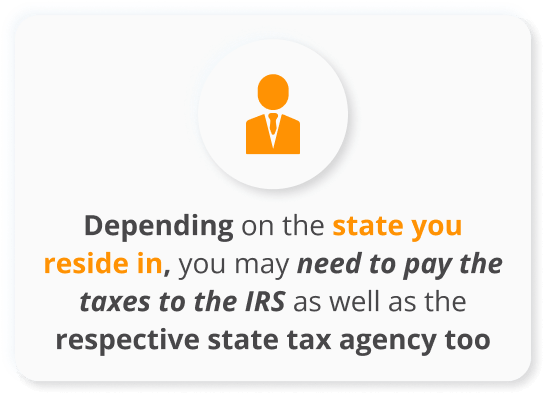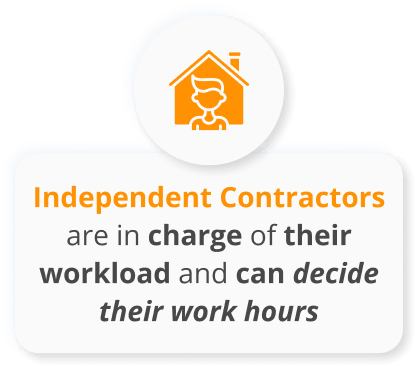If you’re starting a small business or earning money outside of traditional employment, you may be wondering about the differences between a sole proprietor and an independent contractor. I had the same questions when I first started my own business!
In this article, we’ll look at what defines each of these types of workers, the key differences between the two, and reasons why you might pick one over the other when setting up your business or side gig.
What is a Sole Proprietor?
A sole proprietorship is the simplest and most common structure for a small, one-person business. According to the IRS, if you operate a business as a sole proprietor, you and the business are essentially one and the same for tax and liability purposes.
Some key features of a sole proprietorship
-
There is no legal distinction between you and your business – you report all income and expenses on your personal tax return using Schedule C.
-
You retain complete control and decision-making power over the business.
-
There is no formal registration required – you can instantly create a sole proprietorship just by earning self-employment income.
-
You have unlimited personal liability for all debts and obligations of the business. Your personal assets can be seized to settle business debts.
-
Raising investment capital can be difficult since you can’t sell shares of stock like a corporation can
As a sole proprietor, you may offer any type of product or service to customers for a fee. You can hire employees and do business under a trade name if you wish.
Common examples of sole proprietorships include freelance writers, photographers, home cleaning services, electricians, and small online sellers. Any business owned and operated by one person falls under the sole proprietorship umbrella.
What is an Independent Contractor?
An independent contractor is also a self-employed person, but they differ from a sole proprietor in a few ways.
As an independent contractor, or freelancer, you work for clients and companies on a per-job basis rather than being an employee on the payroll. You’re considered self-employed because you run your own business and control how the work is done.
Some key traits of independent contractors:
-
You are hired for specific projects or work assignments, not ongoing roles.
-
You use your own equipment and set your own hours.
-
You submit invoices to get paid per project, not on a recurring paycheck basis.
-
You don’t receive benefits like health insurance and paid vacation time.
-
You are responsible for all taxes and have no tax withholdings from payments.
Common examples of independent contractor roles include graphic designers, website developers, accountants, consultants, real estate agents, and truck drivers. Basically any skilled professional offering services on a contract basis qualifies as an independent contractor.
Unlike a sole proprietor who sells products or undefined services, an independent contractor focuses on completing specific, predefined projects for clients. They must have specialized skills to complete the work.
Key Differences Between Sole Proprietors and Independent Contractors
While sole proprietors and independent contractors do share the common thread of being self-employed, there are some notable differences between these two business structures.
Nature of Business and Services Offered
One major difference is in the type of business operated and how services are sold.
As a sole proprietor, you can sell products or offer any service based on your own discretion, without necessarily having specialized skills. For example, a sole proprietor may run an ecommerce store selling homemade crafts online or offer general services like cleaning houses in their local area.
Independent contractors, on the other hand, tend to focus on providing specialized services that require specific expertise, like financial planning services, legal consulting, or web development. They don’t usually sell pre-made products.
Customers and Clients
This leads to another difference – who they sell to.
Sole proprietors find and sell to their own customers. A freelance writer may cold pitch to magazines and websites to find article assignments. A house cleaner may advertise services to homeowners in a neighborhood. They build up their own client base.
Independent contractors work for clients that come to them. For example, a client hires and pays a graphic designer to create a new logo. The client seeks out and chooses the contractor, not the other way around.
Control Over Work
There is also a difference in who controls the details of the work.
Sole proprietors have complete autonomy in how they deliver products and services to customers. They set their own quality standards and style.
Independent contractors must adhere to standards, styles, and specifications set by their clients. The client oversees the end product. A web developer can’t change agreed upon features mid-project without approval.
Payment Method
Sole proprietors may get paid in any manner they choose – one-time payments, invoices, or recurring subscriptions. A dog walker may charge a flat monthly fee, for example.
Independent contractors typically charge per project, after a job is complete, by submitting an invoice. For example, a marketing consultant bills the client after finishing a strategy document.
Taxes
This leads to some key tax differences as well.
Sole proprietors report all business income and expenses on Schedule C of their personal tax return. They pay personal income tax as well as self-employment tax for Social Security and Medicare.
Independent contractors also pay income and self-employment taxes. But because they work for multiple clients, those clients must issue IRS Form 1099-NEC if they pay more than $600 in a tax year. The contractor includes all 1099 income on Schedule C.
Legal Protections
There are also differences in terms of liability protections and following regulations.
As a sole proprietor, you have unlimited personal liability for the business. You also must comply with regulations for your industry and location. A baker would be responsible for food permits and inspections.
Independent contractors have liability limited to each project, as clients usually can’t sue them for damages beyond the scope and cost of the work. Contractors also don’t need licenses and permits that typical “storefront” businesses require.
Reasons to Choose Sole Proprietor vs. Independent Contractor
When starting a small or side business, should you be a sole proprietor or independent contractor? There are pros and cons to each.
Here are some key reasons you may want to operate as a sole proprietor:
-
You want to sell your own products or offer services without needing special credentials.
-
You want flexibility and control over when, where, and how you work.
-
You plan to work alone and don’t need to legally distinguish the business from yourself.
-
You don’t require payment per project from a single client.
-
Your work doesn’t depend on specific expertise, talent, or training.
Here are some perks of being an independent contractor:
-
You have specialty skills clients want, like graphic design or legal expertise.
-
You want to attract clients who assign and oversee projects.
-
You prefer project-based work and billing rather than selling to individual customers.
-
You can leverage expertise to command higher rates.
-
You want to limit liability to the scope of each project, not your entire business.
In the end, the choice depends on your goals, skills, and business model. Many self-employed individuals actually operate as both sole proprietors and independent contractors! It’s not necessarily an either/or situation.
Making the Decision That’s Right for You
Launching a new business venture is always an exciting and challenging process! As you can see, sole proprietor and independent contractor are just two of the options for structuring your work.
The key is choosing the path that fits your skills, interests, and business objectives. Define your ideal type of work and customers, then determine how sole proprietor or independent contractor best aligns with your vision.
Focus on delivering value, building expertise, and providing amazing products or services, regardless of which structure you choose. With dedication and hustle, you can make your business a success!
If you have any other questions as you start your sole proprietorship or contractor journey, I’m always happy to chat more here in the comments. I remember how confusing these legal terms were at first. We’ve all been there!

Taxes for Sole Proprietorships
In the sole proprietorship model, the individual needs to pay self-employment taxes through tax form 1040 Schedule C, Profit and Loss from Business, which is meant to report income and losses from the profession you practice or the business you operate as a sole proprietor.
All your business income, costs for your goods sold, personal finances, and costs for home-based business are calculated to determine the amount of taxable business income (net income) to file an income tax return.

A sole proprietor is not an employee, and hence as per IRS guidelines, they must pay the estimated taxes throughout the year; rather than paying them all at the end of the year. If you have employees, you need to pay and report FICA taxes that include Social Security and Medicare.
One must pay their income tax each quarter i.e., 15th April, 15th June, 15th September, and 15th January in a particular financial year. Depending on the state you reside in, you may need to pay the taxes to the IRS as well as the respective state tax agency too.
Similar to any other business model, sole proprietors are also prone to business litigations, bankruptcy proceedings, and debt collection. Hence, sole proprietors must be fully insured to protect their business and personal assets against lawsuits, injuries, car accidents, and other similar incidents.

As a sole proprietor, you are not likely to hire employees, but you must still purchase workers’ compensation insurance to protect you against workplace injuries and accidents.
General contractors’ insurance and errors and omissions insurance must be included in your business risk management plan to secure your business against the most common liabilities.
Benefits of Independent Contracting
Being an independent contractor means having the flexibility to work under a self-regulated schedule and guidelines. You are in charge of the workload and can decide your work hours.
The IRS requires independent contractors to report self-employment taxes on a quarterly basis. Their taxes usually include social security tax and Medicare tax.

Unlike typical employee income, your income as an independent contractor doesn’t come in the form of paychecks and so nothing needs to be withheld for payroll taxes.
Instead, your taxes as an independent contractor are imposed on your net income, which are your earnings minus expenditure. So, you get the flexibility to deduct your business expenses such as internet and office bills, meals and travel expenses, and other costs of operating your business.
LLC vs Sole Proprietor: Which is Better for Your Business?
What is a sole proprietorship & how does it work?
A sole proprietorship is a one-person business that hasn’t registered with the state or the IRS as a business entity, like a corporation or LLC. If you earn income from your business, you’re a sole proprietor. A sole proprietor might do work as an independent contractor and receive a 1099 tax form from their clients at the end of the year.
What is the difference between an independent contractor and a sole proprietor?
An independent contractor is someone who does specific work for a company for a set fee. A sole proprietor may do contract work and also earn income through the sale of goods or services. Both types of business must pay self-employment taxes and business income taxes. What Is a Sole Proprietor?
Can a self-employed business be a sole proprietor or independent contractor?
It’s common for self-employed business owners to operate as both sole proprietors and independent contractors, depending on the nature of the business relationship and the taxation structure.
Is a sole proprietor a self-employed person?
Both sole proprietors and independent contractors are self-employed individuals who the legal structure doesn’t classify as employees. Self-employed people don’t work for an employer that pays a consistent wage or salary but instead earn their income by contracting with and providing goods or services to various clients.